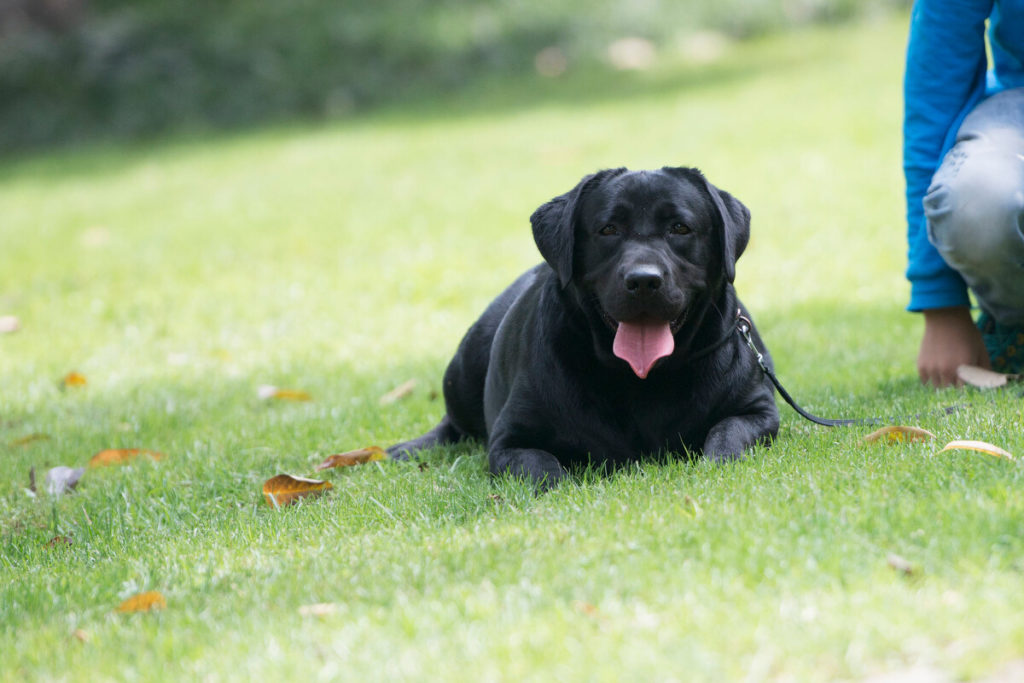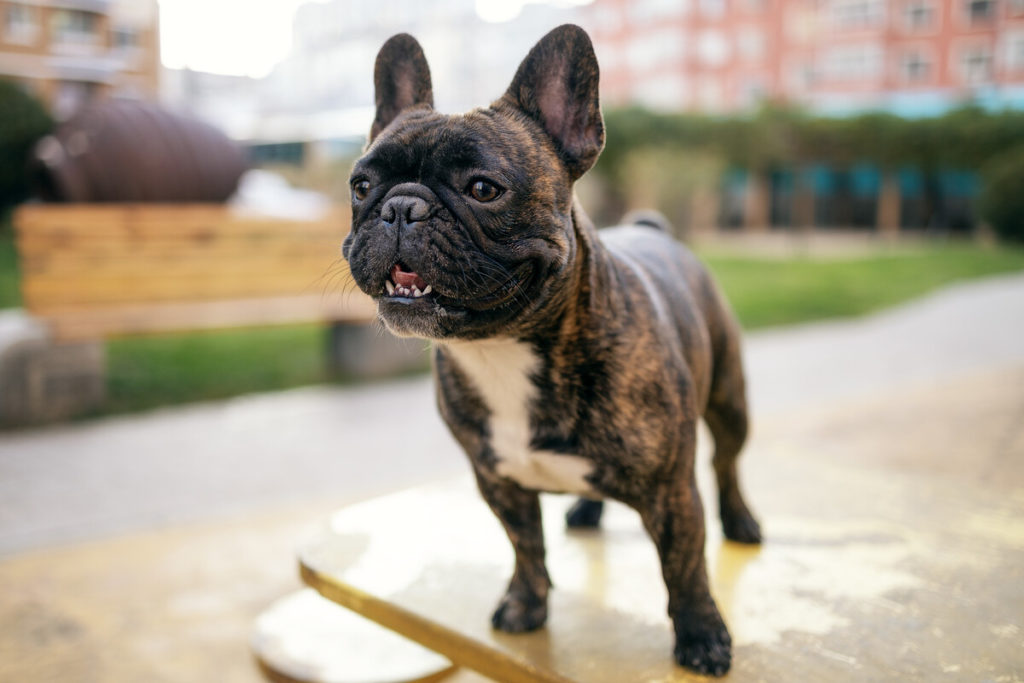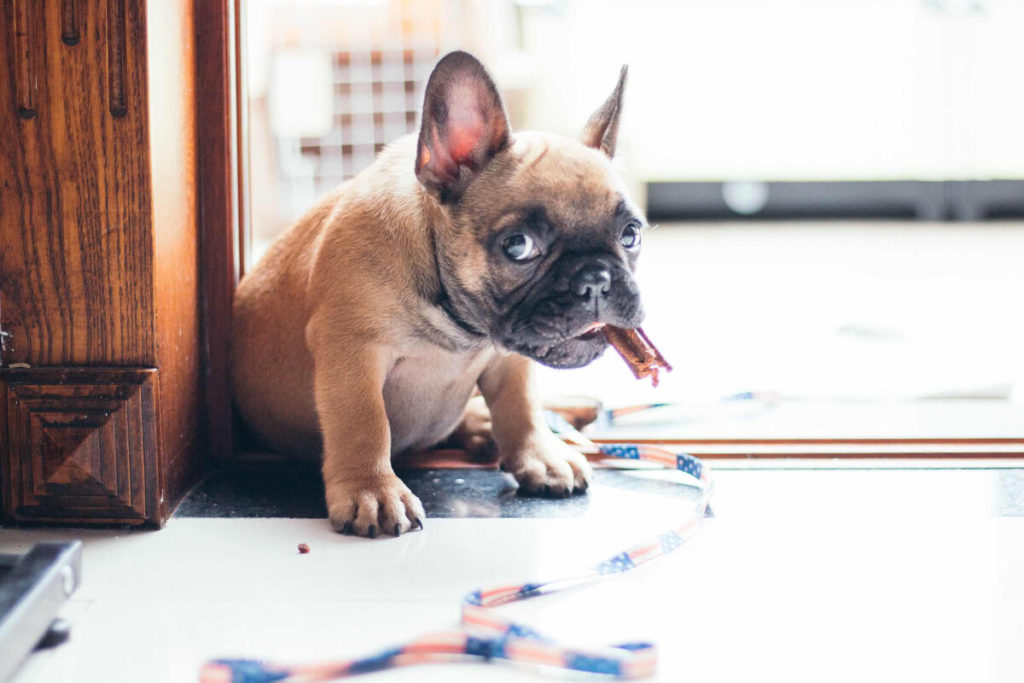A Labrador is a beautiful family dog, and they can also be great helpers, too. Making sure your Lab is bred to be friendly and kind is important, as aggression is an unwanted behavior across the board.
Are Labradors Aggressive?
Typically, Labradors are not aggressive dogs. They are generally easy to train and end up as service or guide dogs. However, if provoked or mistreated, a Labrador can become aggressive.
By understanding the common causes of aggression and the personality of a Lab, you can prepare yourself well for welcoming one into your home.
Aggression in Labradors
The breed standards for Labradors typically state that they are happy-go-lucky, energetic, and kind dogs. Sometimes, however, Labradors that are poorly bred can learn to be aggressive or may have more aggressive personalities.

Any dog, including a well-bred Labrador that is separated from its litter at too young of an age, or that has had bad training may also become aggressive. If you’re looking to make a Labrador a part of your family, it’s important to not just research the breed, but to consider the dog itself.
Aggressive Labradors are the outlier. However, due to the people in their lives, they may have picked up unfortunate tendencies or habits. If this is the case, understanding the dog’s background and what you can do if you have an aggressive Labrador will help improve both your life and the dog’s life.
Why Would a Labrador Be Aggressive?
There are quite a few factors that could cause any dog to be aggressive. For a Labrador, these are the most common:
- Stressful environment
- Lack of training
- Neglectful environment or family
- Poor breeding
- Separation from its mother too early
The most important influence on a dog’s behavior is how it was brought up. If they have experienced hard things, they may develop aggressive behavior or aggressive habits.
Poor breeding must be considered a factor to aggression in typically mild-mannered dogs, not just in Labradors. Inbreeding can alter a dog’s personality. Sometimes, bad breeders just don’t evaluate the personalities of the dogs that they breed. If this is the case, the dog may be truly aggressive by nature.
To see if your Lab would be aggressive due to breeding, try to meet the puppy in an environment where you can meet its parent as well.
Separating a puppy from its litter and mother at too young of an age is hurtful to the dog’s social development and can cause aggression, as well. A happy dog is a socialized dog, and a socialized dog is a happy dog.
So, determining if the dog has had a good amount of exposure to other people and dogs will give you a better understanding of whether it is likely to behave aggressively. If a dog is aggressive because of its environment, experiences, or poor training, then it may be selectively aggressive.
For instance, a dog that is perfectly normal on walks, but attacks the front door whenever the doorbell rings may have had a bad experience or has been trained to handle certain experiences confidently but not others. Dogs who have not been socialized with other dogs or with people may exhibit aggressive behaviors.

What Can You Do About an Aggressive Labrador?
If you find yourself with an aggressive Labrador, it’s important to determine whether the behavior is due to the dog’s personality, or if it is a learned, developed behavior. If it is learned behavior the dog is usually reacting out of fear, confusion, or habit.
What Can I Do About Aggression?
A dog reacting to something that scares him suffers the same consequences as a dog that does the same thing because it is truly aggressive. Managing the dog’s fears through training should help with the dog’s behaviors, but this will take consistent, skilled training.
If you are not confident in your ability to train this way, seek help from a qualified dog trainer. A good trainer can help you not only start the process of taking the edge off your Lab’s bad habits, but can help you see if something you’re doing is causing your Lab to react inappropriately.
Are Labradors Easier to Train Out of Aggression?
Labradors are trainable. It’s one of the breed’s inherent standards. This means that even if your Lab has an aggressive personality by default, whether it’s been poorly socialized or poorly bred, there is the potential for you to “deprogram” these behaviors through consistently working with your dog.
By dedicating your time to creating boundaries for your Lab, you are giving him confidence.
Due to their background as hunting dogs, Labradors are submissive pack animals. Dogs feel most comfortable when they understand their own role in their relationship with you, so by defining your relationship with your retriever, you are giving him the tools to be more successful.
Labradors are a Good Choice
One of the most important parts of having a dog is taking care of its safety. If a dog is aggressive, it’s not just dangerous for other people and dogs; it’s a danger to itself. It’s not fun to have a dog that you can’t trust, and it puts an extra layer of stress on you when you can’t depend on your Lab to behave.
If you’re looking for a dog that, by the breed standard, can be trusted to be non-aggressive, a Labrador may fit your lifestyle. If you’re able to provide consistent, regular training, and keep them exercised, a Labrador may be perfect for your family, even if you have small children or other pets.

Jobs Today
Today, we see many Labradors being bred as working dogs. The breed is known to be serious when working, but lighthearted and kind in the home.
They are still seen on the hunt fields today, but even more commonly work as search and rescue dogs, drug dogs, cadaver dogs, or service dogs. Labradors bond closely with their handler at work and can be trained to be trusted in the most hectic of public situations.
Most Labradors, however, don’t have jobs at all. They’re pets, and they’re the third most popular dog in the United States. These dogs are desired for their trainability, their loyalty, and their personalities.
These qualities make them wonderful companions for any family. Exactly what made them wonderful hunting dogs on the moors have made them into a common and well-loved pet.

Conclusion
While Labradors are great tempered dogs, just remember that a bad environment can cause them to be ill-tempered just like any animal.
If you choose to adopt or home a troubled Lab, be sure that you can provide a proper environment. This includes training opportunities to try to improve his or her behavior. Proper training with a professional can take a good amount of money, so be sure that you can afford to keep the dog in regular training classes.
While it is not suggested that you adopt an aggressive dog, if you take an aggressive Labrador into your home, its train-ability should help you improve his life.




